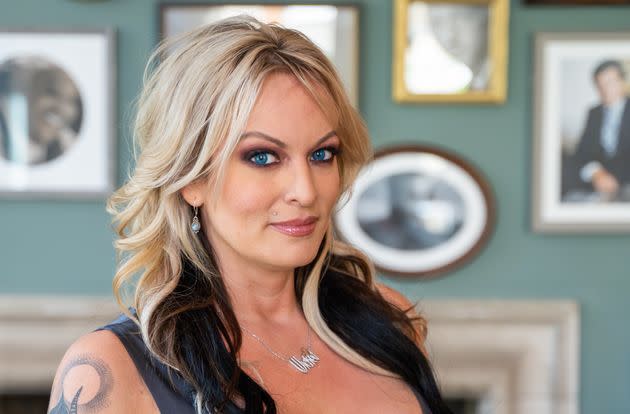Michael Cohen: Trump Didn’t Deny Stormy Affair, Called Her 'Beautiful'
Michael Cohen, former personal attorney to Donald Trump, testified against the ex-president on Monday and Tuesday in his New York criminal hush money trial, corroborating claims of a remarkable effort to silence stories that could be damaging to Trump in the days before the 2016 presidential election.
While Cohen has been cooperating with government prosecutors for several years, his appearance on the witness stand is an extraordinary moment in his long relationship with Trump — a man for whom Cohen once said he would “take a bullet.” (This quote was actually entered into the court record.)
Under questioning from prosecutor Susan Hoffinger, Cohen described how he cajoled, aggressively bullied and outright lied to do whatever Trump asked of him.
“The only thing that was on my mind was to accomplish the task, to make him happy,” he said Monday. “I did... what was needed in order to accomplish the task.”
On Tuesday, Cohen delved into the factors that ultimately led him to turn on Trump: an early morning FBI raid and a heart-to-heart with his family.
“My wife, my daughter, my son all said to me: ‘Why are you holding on to this loyalty? What are you doing? We’re supposed to be [your] first loyalty,’” Cohen said.
As she wrapped her direct examination, Hoffinger called on Cohen to reflect on his own actions.
“I violated my moral compass, and I suffered the penalty,” Cohen testified.
When Trump first hired him, Cohen earned $525,000 a year doing things like calling vendors and renegotiating bills to a fraction of their original cost, or threatening media outlets over negative stories about his boss.
But as the 2016 election cycle progressed, Cohen’s role shifted. He started negotiating with National Enquirer executives, including publisher David Pecker, to conjure positive coverage for his boss.
At the same time, and with Trump’s explicit approval, Cohen bought the rights to negative stories through the Enquirer’s parent company, American Media Inc. The stories were then locked away in a scheme known as “catch and kill.”
Cohen said he was closely involved with hush money payments that prosecutors say were made during Trump’s 2016 campaign, including a $150,000 sum to former Playboy model Karen McDougal, who says she had a yearlong affair with Trump in the mid-2000s.
When he first heard about McDougal’s story, Cohen said he immediately went to Trump in person to warn him about the damage it could cause.
“His response to me was, ‘She’s really beautiful,’” he recalled. “I said, ‘OK, but there’s a story that’s right now being shopped.’” Cohen said Trump told him to “make sure it doesn’t get released.”
The two bought the rights to McDougal’s life story for $150,000, prompting a scramble to repay Pecker. As Trump delayed furnishing the funds, Cohen recalled having lunch with a “very” upset Pecker, who told him the sum was “too much to hide” from his parent company.
“What I was doing, I was doing at the direction of and for the benefit of Mr. Trump,” Cohen testified.
Pecker relented after a Men’s Health magazine cover featuring McDougal sold more copies than expected, and AMI ended up more than recouping its money.

Cohen also spoke at length about how he orchestrated a hush money payment to adult film actor Stormy Daniels, who maintains that she had an affair with Trump in 2006. Daniels’ desire to make her allegation public knowledge during Trump’s 2016 campaign for the presidency set into motion the chain of events that led New York prosecutors to charge Trump with 34 counts of falsifying business records.
“Trump told me that he was playing golf with ‘Big Ben’ Roethlisberger... and they had met Stormy Daniels and others there,” Cohen recalled, adding that Trump expressed the sentiment “that women prefer Trump even over someone like Big Ben.” (Multiple women have accused Roethlisberger of sexual assault.)
Cohen affirmed that he asked Trump whether Daniels’ claim was true, but that Trump did not respond directly, only acknowledging that Daniels was a “beautiful woman.”
At Trump’s direction, Cohen yet again hashed out a deal to purchase Daniels’ story through AMI so it wouldn’t hurt Trump’s presidential campaign.
Once again, Trump slow-walked the actual payment. Cohen said Trump hoped to buy time until the election was over, at which point it wouldn’t matter to Trump if the allegation came out.
But once Daniels’ lawyer started shopping her story around after the financial deadline passed, Cohen decided to pay the money himself ― through a shell company ― after Trump reassured him he’d be reimbursed.
Trump denies the affair and has pleaded not guilty in the case.

Tuesday afternoon marked the beginning of Cohen’s cross-examination, handled by Trump attorney Todd Blanche.
Blanche came out swinging, demanding to know within seconds of starting his questioning, “You went on TikTok and called me a ‘crying little shit,’ didn’t you?”
Prosecutors immediately lodged an objection, which the judge sustained.
Questions surrounding Cohen’s credibility have received particularly special attention by attorneys on both sides. That’s because Cohen was already convicted of trying to cover up misdeeds, although he says he did so on Trump’s behalf.
In August 2018, Cohen pleaded guilty to federal criminal charges stemming from the hush money payment to Daniels, including tax evasion and campaign finance violations. In November 2018, he pleaded guilty to charges of lying to Congress about a different matter: Trump’s real estate negotiations in Moscow. He agreed to cooperate with prosecutors and was sentenced to three years in prison in December 2018. Due to the coronavirus pandemic, Cohen was transferred to home confinement and was finally released in November 2021.
Since turning against Trump, Cohen has built a megaphone to apologize for enabling his former client and to attack Trump’s character and fitness for office. The former lawyer has written two books about the presumptive 2024 GOP presidential nominee: 2020’s “Disloyal: A Memoir” and 2022’s “Revenge: How Donald Trump Weaponized the U.S. Department of Justice Against His Critics.”
In February 2021, Cohen interviewed Daniels on his podcast, “Mea Culpa,” to apologize for causing her “needless pain.”
“Both of our stories will be forever linked with Donald Trump, but also with one another,” Cohen told Daniels at the time. “Thanks for giving me a second chance.”

